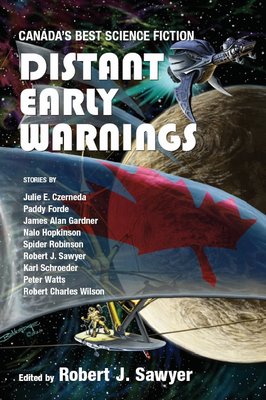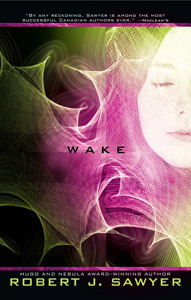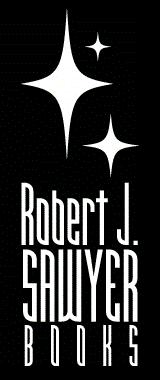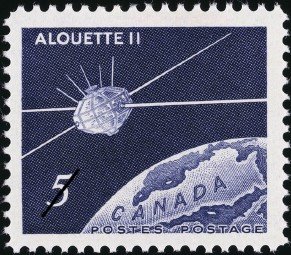
Click picture for a larger version
(Table of Contents)
INTRODUCTIONThirty years ago, in 1979,
John Robert Colombo published a massive anthology called
Other Canadas in which he culled the best of four centuries of Canadian fantastic literature. That book was a watershed: it established definitively that Canada did have a tradition of science fiction and fantasy writing.
Thirty years ago, I was nineteen; I wasn't part of that book. Except for Spider Robinson, none of the authors collected here were. Colombo planted a seed with
Other Canadas; what you hold in your hands is — if I may be so bold — the cream of the crop that grew from that seed.
Recently, Jane Urquhart came under attack for
The Penguin Book of Canadian Short Stories, which she edited. To her critics, some omissions seemed glaring, some inclusions dubious. So, given that I've subtitled this anthology
Canada's Best Science Fiction, let me define my terms and explain my selection criteria.
By "Canada's," I mean authors who live in this country. I'm frankly tired of hearing Canadians trumpet that actors Pamela Anderson, Jim Carrey, and William Shatner are Canadians. No doubt they legally are, but they don't live or work here. Likewise, I've left out authors who have decided to call somewhere else their home — my point being that there's no need to reach beyond our borders to fill a book such as this.
"Best" is, I grant you, a subjective judgment — but let me point out an objective fact: every author in this book has either won or been nominated for the Hugo Award (the top international prize for science-fiction writing); or won or been nominated for the Nebula Award (the "Academy Award" of the science fiction field, given by the inaccurately named Science Fiction and Fantasy Writers of America, which has members in 23 countries, and has had a Canadian Region since 1993); or has won Canada's top SF book award, the Aurora.
(Specifically, Robinson, Sawyer, and Wilson have won the Hugo, and Forde, Gardner, Hopkinson, and Watts have been nominated for it; Robinson and Sawyer have won the Nebula, and Gardner and Hopkinson have been nominated for it; Czerneda, Hopkinson, Sawyer, Schroeder, and Wilson have won the best-novel Aurora, and Gardner, Robinson, and Watts have been nominated for it.)
By "science fiction," I mean the real thing: stories that reasonably extrapolate from known science; stories that might plausibly happen. Thirty years ago, when Colombo pulled together his anthology, he needed to combine SF with fantasy, horror, magic realism, and folk tales to make a book. Today, we can easily fill a book not just with real science fiction authored by Canadians, but with real science fiction by world-class writers who just happen to be Canadian.
In addition to the words in the subtitle, I decided to add one more criterion for inclusion in the present volume: Colombo had scoured 400 years of history for his selections; my goal is to demonstrate that there's a vigorous, active SF writing community in Canada
right now. Every one of the stories in this book was first published in the 21st century. (This decision did have one sad effect: William Gibson, winner of the Hugo, the Nebula, and the Aurora Awards for best novel of the year, simply hasn't written any short fiction this millennium.)
There is, of course, a separate literary tradition of French Canadian science fiction. I commend to your attention particularly the work of Joël Champetier, Yves Meynard, Esther Rochon, Daniel Sernine, Jean-Louis Trudel, and Élisabeth Vonarburg. Indeed, this book's official launch will be in August 2009 at Anticipation, the World Science Fiction Convention, which this year is being held in Montreal, and is featuring programming in both French and English. Élisabeth Vonarburg is the
Invitée d'honneur, Julie E. Czerneda is the toastmaster, and John Robert Colombo — at last getting his due — is keynote speaker (the first one ever at a Worldcon) for the convention's academic track.
Distant Early Warnings isn't dedicated to John Colombo because my wife Carolyn Clink and I dedicated our earlier anthology
Tesseracts 6, part of the long-running series of Canadian science-fiction anthologies founded by the late, great
Judith Merril, to him. But without John standing up and saying to the Canadian publishing world, and to Canada's academics, that there was such a thing as domestic Canadian SF, the field would not be nearly as rich and varied as it is today, and my hat is off to him.
This book isn't just intended for Canadian readers: after all, every single one of the authors included here has a significant international following (Paddy Forde is the one name that might not immediately ring a bell, since, to date, he has published only short fiction; however he has
twice won the Analytical Laboratory Award from New York-based
Analog, the world's top-selling English-language SF magazine, for best novella of the year).
And since we
are also catering to readers outside Canada, and since I've gone on at length about the subtitle, let me say a word about the title. The Distant Early Warning Line — or DEW Line — was a string of radar stations in Canada's far north designed to detect incoming Soviet bombers during the Cold War. But the phrase also evocatively sums up what good science fiction does, providing us with advance reports of the wonders — and the dangers — that await us in all the myriad futures that might yet come to pass.
— Robert J. Sawyer
Mississauga, Ontario
April 2009
The book concludes with a section I've dubbed the "Lightning Round," introduced thus:
The world's top two scientific journals are the American Science and the British Nature. In recent years, Nature has been running very short science-fiction stories, each no more than 800 words in length, as a feature called "Futures." The initial offering was by none other than Arthur C. Clarke. Five of the authors who have longer stories in this anthology have also contributed pieces to Nature, which we offer here — a final lightning round of distant early warnings.
Distant Early Warnings: Canada's Best Science FictionEdited by Robert J. Sawyer
Stories by Julie E. Czerneda, Paddy Forde, James Alan Gardner, Nalo Hopkinson, Spider Robinson, Robert J. Sawyer, Karl Schroeder, Peter Watts, and Robert Charles Wilson
Poetry by David Livingstone Clink and Carolyn Clink
Cover by James Beveridge
Published by
Robert J. Sawyer Books, August 2009, an imprint of Red Deer Press (a Fitzhenry & Whiteside company)
Visit The Robert J. Sawyer Web Site
and WakeWatchWonder.com
Labels: DEW






